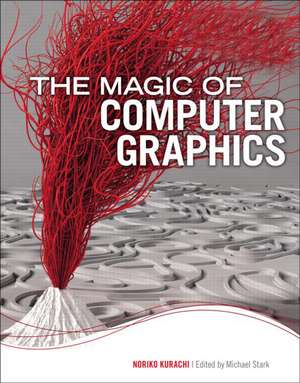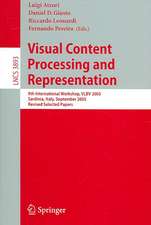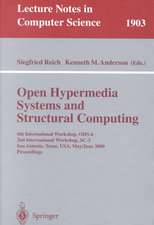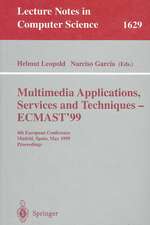The Magic of Computer Graphics
Autor Noriko Kurachien Limba Engleză Paperback – iun 2011
Starting from the basic behavior of light, the first section of the book introduces the most useful techniques for global and local illumination using geometric descriptions of an environment. The second section goes on to describe image-based techniques that rely on captured data to do their magic. In the final section, the author looks at the synthesis of these two complementary approaches and what they mean for the future of computer graphics.
| Toate formatele și edițiile | Preț | Express |
|---|---|---|
| Paperback (1) | 307.16 lei 43-57 zile | |
| CRC Press – iun 2011 | 307.16 lei 43-57 zile | |
| Hardback (1) | 902.43 lei 43-57 zile | |
| CRC Press – 18 dec 2020 | 902.43 lei 43-57 zile |
Preț: 307.16 lei
Preț vechi: 411.58 lei
-25% Nou
Puncte Express: 461
Preț estimativ în valută:
58.77€ • 61.53$ • 48.63£
58.77€ • 61.53$ • 48.63£
Carte tipărită la comandă
Livrare economică 07-21 aprilie
Preluare comenzi: 021 569.72.76
Specificații
ISBN-13: 9781568815770
ISBN-10: 1568815778
Pagini: 448
Dimensiuni: 191 x 235 x 28 mm
Greutate: 0.95 kg
Ediția:1
Editura: CRC Press
Colecția A K Peters/CRC Press
ISBN-10: 1568815778
Pagini: 448
Dimensiuni: 191 x 235 x 28 mm
Greutate: 0.95 kg
Ediția:1
Editura: CRC Press
Colecția A K Peters/CRC Press
Public țintă
Academic and Professional Practice & DevelopmentCuprins
Geometry-Based Approaches: Introduction to Photorealistic Rendering. Global Illumination. Volume Rendering and Participating Media. Subsurface Scattering. Image-Based Approaches: Image-Based Rendering. High Dynamic Range Imaging. Image-Based Lighting. Coalescence of Geometry-Based and Image-Based Approaches: Reconstruction of Reflectance. Bidirectional Texture Function. Radiance Transfer.
Recenzii
" ... mathematical ideas are conveyed clearly, with both formulas and intuitive discussions. Algorithms are presented in understandable prose (not code or pseudo code). The book covers not just the most compelling rendering methods of the 1990s and 2000s but also background on the physical lighting models that underlie the standard Kajiya rendering equation. Many illustrations help convey the material. Includes 12 pages of color plates. ... Recommended"
— S. L. Tanimoto, University of Washington in CHOICE Magazine
"Ms. Kurachi’s text is one we’d warmly recommend to those familiar with the field, who want to have a nicely put together cross-section on hand."
— Alex Voicu, Beyond3D, October 2011
"… providing students and computer graphics users with specifics on image-based rendering and offering chapters packed with discussions of environmental maps, BRF synthesis, BSSRDF models, and much more. Technical college-level collections strong in computer graphics models will find this a popular reference."
— Midwest Book Review, October 2011
"… if you are interested in computer graphics, then it has to be on your bookshelf … If you can cope with the math and you want to explore some topics in computer graphics which are the subject of current research, then this is a really good book."
— Mike James, IProgrammer, August 2011
"The book you hold today tells the story of this new era of computer graphics. Working closely with researchers who helped lead this revolution, Noriko Kurachi describes these key innovations and brings them together as a coherent body of knowledge. Please read this book, practice the techniques, and figure out if they will allow you to create the visions you have in your mind."
— Paul Debevec, pioneer in HDR imaging and image-based modeling
"The 406-page book is rich in discussion, tutorial, and tricks. This book will find an important place in the library of all those who have a geek-love of pixels."
— Jon Peddie's Tech Watch, September 2010
— S. L. Tanimoto, University of Washington in CHOICE Magazine
"Ms. Kurachi’s text is one we’d warmly recommend to those familiar with the field, who want to have a nicely put together cross-section on hand."
— Alex Voicu, Beyond3D, October 2011
"… providing students and computer graphics users with specifics on image-based rendering and offering chapters packed with discussions of environmental maps, BRF synthesis, BSSRDF models, and much more. Technical college-level collections strong in computer graphics models will find this a popular reference."
— Midwest Book Review, October 2011
"… if you are interested in computer graphics, then it has to be on your bookshelf … If you can cope with the math and you want to explore some topics in computer graphics which are the subject of current research, then this is a really good book."
— Mike James, IProgrammer, August 2011
"The book you hold today tells the story of this new era of computer graphics. Working closely with researchers who helped lead this revolution, Noriko Kurachi describes these key innovations and brings them together as a coherent body of knowledge. Please read this book, practice the techniques, and figure out if they will allow you to create the visions you have in your mind."
— Paul Debevec, pioneer in HDR imaging and image-based modeling
"The 406-page book is rich in discussion, tutorial, and tricks. This book will find an important place in the library of all those who have a geek-love of pixels."
— Jon Peddie's Tech Watch, September 2010
Descriere
Starting from the basic behavior of light, Ms. Kurachi introduces the most useful techniques for global and local illumination using geometric descriptions of an environment in the first section. She then goes on to describe image-based techniques that rely on captured data to do their magic in the second section. In the final section, she looks at the synthesis of these two complementary approaches and what they mean for the future of computer graphics.















